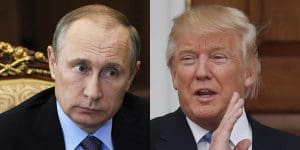Putin and Trump publicly endorse expanding their nations' nuclear capabilities
Russia’s recent ramp-up of its nuclear arsenal, including flagrant violations of longstanding nuclear arms treaties, has been chillingly detailed by my colleague Ginger McKnight-Chavers. Much of this escalation has gone without wide notice, and without public commentary from Russian President Vladimir Putin. But now, Putin has given an address at an annual meeting of the […]

Russia’s recent ramp-up of its nuclear arsenal, including flagrant violations of longstanding nuclear arms treaties, has been chillingly detailed by my colleague Ginger McKnight-Chavers. Much of this escalation has gone without wide notice, and without public commentary from Russian President Vladimir Putin.
But now, Putin has given an address at an annual meeting of the Defense Ministry, during which he called for Russia to “fortify its military nuclear potential and develop missiles that can penetrate any missile-defense system.”
“We need to strengthen the strategic nuclear forces, for that we should develop missiles capable of penetrating any current and prospective missile defense systems,” Putin said at a defense ministry meeting, according to Tass news agency.
“We must carefully monitor any changes in the balance of power and in the political-military situation in the world, especially along Russian borders, and quickly adapt plans for neutralizing threats to our country,” the president said.
What Putin is advocating is not merely the bolstering of defense capabilities. He is talking about strengthening offensive capabilities, which is yet another alarming indication of escalating aggression.
In what appears to be a response to Putin’s speech, U.S. President-elect Donald Trump tweeted, without regard for the fact that there is still a sitting president who oversees established nuclear policy:
The United States must greatly strengthen and expand its nuclear capability until such time as the world comes to its senses regarding nukes
— Donald J. Trump (@realDonaldTrump) December 22, 2016
One way to interpret this tweet is that Trump has become brittle over the relentless criticism that he is Putin’s puppet, and has decided to assert his independence by flexing America’s nuclear muscle.
A more likely possibility is that Trump is parroting Putin’s nuclear escalation in some sort of unsettling bid to continue to build bridges with a dangerous authoritarian with whom the incoming U.S. president is unduly enamored.
Neither possibility is reassuring.
This scary posturing about nuclear escalation comes in tandem with a new report that the cybersecurity firm CrowdStrike has “uncovered strong proof of the tie between the group that hacked the Democratic National Committee and Russia’s military intelligence arm — the primary agency behind the Kremlin’s interference in the 2016 election.”
CrowdStrike co-founder Dmitri Alperovitch said his firm has “high confidence” the hacking was executed by a unit of the GRU, Russia’s military intelligence agency.
“The GRU is used for both tactical intelligence collection in the battlefield in support of Russian military operations and also strategic active measures or psychological warfare overseas,” said Alperovitch, who is an expert on Russia and a senior fellow at the Atlantic Council. “The fact that they would be tracking and helping the Russian military kill Ukrainian army personnel in eastern Ukraine and also intervening in the U.S. election is quite chilling.”
That Putin personally directed hacking done by Russia’s military intelligence agency, and Trump continues to refuse to condemn it, or indeed even accept the U.S. intelligence community’s conclusion Russia was responsible for it, is deeply troubling.
We are witnessing an abrupt and fundamental shift in American foreign policy, our alliances, and our place in the global community.
And it is not, as many have asserted, a return to the Cold War. It is, as has been explained in distressing detail by Sarah Kendzior, the precise opposite: Two like-minded despots building a partnership.
Trump and Putin are two of a kind: xenophobic, bigoted demagogues with dual histories of corruption, aggression, and celebration of white supremacy repackaged as patriotic nationalism. Their radical American and Russian followers, now linked by the internet, share similar goals and are part of a larger revival of white-supremacist movements happening across the West.
After the USSR collapsed twenty-five years ago, Russia is no longer the center of the communist Soviet Union but rather a hyper-capitalist, authoritarian state. Dominated by oligarchs, modern Russia has retained the worst trappings of the Soviet system—such as mass surveillance and personality cults—while cracking down on political dissidents, gays and lesbians, Muslims, Jews, migrant laborers, and others who do not fit with Putin’s nationalist vision. In other words, he engages in many of the same practices Trump proposes.
Critics of this relationship are therefore not merely reacting to outdated Cold War stereotypes—in fact, many are not even old enough to remember this era. Rather, they are rightfully wary of a mutually beneficial relationship between a Russian dictator and an American demagogue that could ultimately harm citizens of Russia, citizens of the US, and citizens of the many other states most directly affected by this alliance, starting with Ukraine and the Baltic members of NATO.
Two of a kind, with a similar mind about the expansion of power, abuses against marginalized people, and belligerent nuclear aggression.
Recommended

More than half of Republican Jay Ashcroft’s funding comes from outside Missouri
Ashcroft has criticized other campaigns for relying on out-of-state donors
By Jesse Valentine - April 25, 2024
Battleground GOP candidates rally around Trump’s tax cuts for the rich
Even Larry Hogan, a Trump critic, supports the former president’s tax policy.
By Jesse Valentine - April 12, 2024
A deleted tweet and a fundraising plea: Mike Rogers bends the knee to Trump
Trump endorsed Rogers’ U.S. Senate campaign on March 12
By Jesse Valentine - March 20, 2024














































































